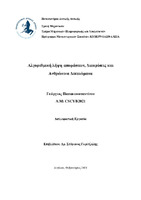| dc.contributor.advisor | Gritzalis, Stefanos | |
| dc.contributor.author | Παπακωνσταντίνου, Γεώργιος | |
| dc.date.accessioned | 2023-07-27T07:19:55Z | |
| dc.date.available | 2023-07-27T07:19:55Z | |
| dc.date.issued | 2023-05-14 | |
| dc.identifier.uri | https://polynoe.lib.uniwa.gr/xmlui/handle/11400/4873 | |
| dc.identifier.uri | http://dx.doi.org/10.26265/polynoe-4711 | |
| dc.description.abstract | Η διείσδυση της αλγοριθμικής λήψης αποφάσεων σε πολλούς τομείς της σύγχρονης ζωής, όπως η ιατρική, η δικαιοσύνη, η ασφάλεια, η εκπαίδευση κ.α. κομίζει πολλαπλά οφέλη, μεταξύ των οποίων ξεχωρίζει η μείωση των ανθρώπινων λαθών κατά τη λήψη αποφάσεων, η καταπολέμηση της μεροληψίας κατά τη λήψη αποφάσεων από ανθρώπους, η βελτίωση της ακρίβειας των λαμβανομένων αποφάσεων, η επιτάχυνση λήψης απόφασης κ.α.. Ωστόσο, λαμβάνοντας υπόψη το γεγονός ότι όταν οι αποφάσεις λαμβάνονται από ανθρώπους δεν επενεργεί μόνον η πιθανή μεροληψία των ίδιων των ανθρώπων αλλά και ένα σύνολο νόμων, κανονισμών και ηθικών περιορισμών ή αρχών, εγείρονται σημαντικά ζητήματα και ανησυχία καθώς τα υπολογιστικά συστήματα είναι δύσκολο να λάβουν μια απόφαση εφαρμόζοντας το ίδιο σύνολο νόμων κανονισμών και ηθικών περιορισμών ή αρχών. Εντούτοις, μολονότι μεγάλη μερίδα των ακαδημαϊκών θεωρεί πως η αλγόριθμοι και λήψη αποφάσεων μπορεί να οδηγήσει σε μείωση της μεροληψίας σε πολλές εκφάνσεις της σύγχρονης ζωής, υπάρχει σημαντικός αντίλογος και ανησυχία αναφορικά με την πιθανή παραβίαση των ανθρωπίνων δικαιωμάτων και την πιθανή δημιουργία καλλιέργεια ή διεύρυνση διακρίσεων. Στα πλαίσια της παρούσης πτυχιακής εργασίας εξετάστηκε η αλγοριθμική λήψη αποφάσεων τόσο υπό το πρίσμα των πλεονεκτημάτων και μειονεκτημάτων εφαρμογής της όσο και υπό το πρίσμα του πεδίου εφαρμογής της, με έμφαση στο σεβασμό των ανθρωπίνων δικαιωμάτων και στην αποφυγή δημιουργίας διακρίσεων. διαφαίνεται ότι η αυστηρή μεταφορά του νομοθετικού πλαισίου στους ίδιους τους αλγορίθμους μέσω των οποίων λαμβάνονται οι αποφάσεις μπορεί να οδηγήσει σε σχεδόν εξάλειψη της πιθανότητας δημιουργίας διακρίσεων και παραβίασης των ανθρωπίνων δικαιωμάτων. ωστόσο εγείρονται ανησυχίες όσον αφορά στην επίδραση που μπορεί να έχει η αλγοριθμική λήψη αποφάσεων με επίγνωση των διακρίσεων στο κόστος της διαδικασίας αλγοριθμικής λήψης αποφάσεων και εν γένει στην ίδια την εφικτότητα και βιωσιμότητα εφαρμογής της. Μέσω της παρούσης πτυχιακής εργασίας προτείνεται ότι τα οφέλη από την αλγοριθμική λήψη αποφάσεων υπερκερνούν τα μειονεκτήματα και τους φόβους περί δημιουργίας διακρίσεων και προτείνεται η συνέχιση και εντατικοποίηση της έρευνας προκειμένου να δημιουργηθεί ένα σύνολο αρχών επί των οποίων θα σχεδιάζονται οι αλγόριθμοι προκειμένου να παραμένουν βιώσιμοι αλλά και να αποκλείεται σε μεγάλο ποσοστό η δημιουργία διακρίσεων. | el |
| dc.format.extent | 95 | el |
| dc.language.iso | el | el |
| dc.publisher | Πανεπιστήμιο Δυτικής Αττικής | el |
| dc.publisher | State University of Moldova | en |
| dc.publisher | Technical University of Moldova | en |
| dc.publisher | Academy of Economic Studies of Moldova | en |
| dc.publisher | Alecu Russo State University of Bălți | en |
| dc.publisher | L. N. Gumilyov Eurasian National University | en |
| dc.rights | Αναφορά Δημιουργού - Μη Εμπορική Χρήση - Παρόμοια Διανομή 4.0 Διεθνές | * |
| dc.rights | Αναφορά Δημιουργού - Μη Εμπορική Χρήση - Παρόμοια Διανομή 4.0 Διεθνές | * |
| dc.rights | Αναφορά Δημιουργού - Μη Εμπορική Χρήση - Παρόμοια Διανομή 4.0 Διεθνές | * |
| dc.rights | Αναφορά Δημιουργού - Μη Εμπορική Χρήση - Παρόμοια Διανομή 4.0 Διεθνές | * |
| dc.rights.uri | http://creativecommons.org/licenses/by-nc-sa/4.0/ | * |
| dc.subject | Algorithmic decision-making | el |
| dc.subject | Discrimination | el |
| dc.subject | Human rights | el |
| dc.subject | Cybersecurity | el |
| dc.subject | Artificial intelligence | el |
| dc.title | Αλγοριθμική λήψη αποφάσεων, διακρίσεις και ανθρώπινα δικαιώματα | el |
| dc.title.alternative | Algorithmic decision making, discriminations and human rights | el |
| dc.type | Μεταπτυχιακή διπλωματική εργασία | el |
| dc.contributor.committee | Μαυρομμάτης, Κωνσταντίνος | |
| dc.contributor.committee | Γιαννακόπουλος, Παναγιώτης | |
| dc.contributor.faculty | Σχολή Μηχανικών | el |
| dc.contributor.department | Τμήμα Μηχανικών Πληροφορικής και Υπολογιστών | el |
| dc.contributor.master | Κυβερνοασφάλεια | el |
| dc.description.abstracttranslated | The penetration of algorithmic decision-making in many areas of modern life, such as medicine, justice, security, education, etc. brings multiple benefits, among which stands out the reduction of human errors in decision-making, the fight against bias in decision-making by humans, the improvement of the accuracy of decisions made, the acceleration of decision making, etc. However, taking into account the fact that when decisions are made by humans it is not only the possible bias of the people themselves that acts, but also a set of laws, regulations and ethical restrictions or principles, important issues and concerns arise as computer systems are difficult to make a decision applying the same set of laws, regulations and ethical restrictions or principles. However, although a large proportion of academics believe that algorithms and decision-making can lead to a reduction in bias in many aspects of modern life, there is considerable controversy and concern regarding the possible violation of human rights and the possible cultivation or widening of discrimination. In the context of this thesis, algorithmic decision-making was examined both in the light of the advantages and disadvantages of its implementation and in the light of its scope, with emphasis on respect for human rights and non-discrimination. It appears that the strict transposition of the legislative framework into the very algorithms through which decisions are taken may lead to the almost elimination of the possibility of discrimination and violation of human rights. However, there are concerns about the impact that discrimination-aware algorithmic decision-making can have on the cost of algorithmic decision-making and in general on the feasibility and sustainability of its implementation. Through this thesis, it is proposed that the benefits of algorithmic decision-making outweigh the disadvantages and fears of discrimination and it is proposed that the research should continue and be intensified in order to create a set of principles on which algorithms will be designed in order to remain viable but also to exclude to a large extent the creation of discrimination. | el |


